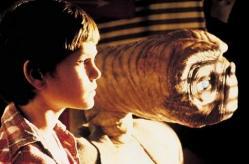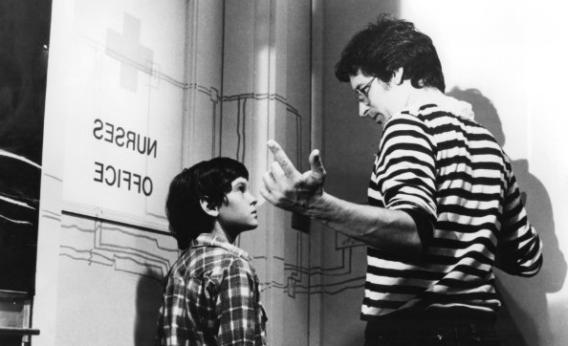Henry Thomas’s audition for the role of Elliott in E.T. The Extra Terrestrial has begun to go viral across the web this week. The video is remarkable: Thomas was only 11 years old at the time of the film’s release, but already at his first audition his performance is heartbreaking. Over the course of a three minute improvisation, he builds from shame to anger and finally to a spontaneous explosion of real tears. At the end of the clip you can hear an emotional Steven Spielberg pipe up from off camera: “OK kid, you got the job.”
The power of Thomas’s performance is undeniable—it’s clear that he’s summoning real pain. According to a 1991 issue of TV Guide, Thomas found the right mood for the audition by thinking of his dead dog. In this way he hit on the movie’s most powerful emotion perfectly: E.T., while sometimes dismissed as sappy, is in the end about a child’s tragic first realization that there are some things he will never get back. When Elliott says goodbye to E.T. he is also feeling the loss of his father, who has left his family for a woman in Mexico. Spielberg himself based the E.T. character on the kind of imaginary friend he created for himself as a boy, after his own parents divorced.
But the story of how Henry Thomas became Elliott is fuller than the video suggests. Spielberg first noticed Thomas in the 1981 drama Raggedy Man, in which Thomas made his film debut playing Sissy Spacek’s son. Spielberg had auditioned more than 100 kids when Thomas finally came in, a fanatic for Raiders of the Lost Ark, with a bullwhip and an Indy hat on his head. However, while some this week have called this “the world’s best audition,” it didn’t start out so well. According to producer Kathleen Kennedy, Thomas was so nervous to meet Spielberg that when he sat down for his line reading “frankly, he didn’t do very well.” After the disappointing reading, Spielberg asked him to do the improv scene that we see here, with casting director Mike Fenton. Spielberg knew right away that Thomas had nailed it:
The improvisation was so heartfelt and honest that I gave him the part right there. … I was blown away by this nine-year-old. Then I came to realize he’s an adult actor, not a nine-year-old. He’s a very controlled, methodical performer who measures what he does and feels what he does and yet broadcasts it in a totally subtle way. His performance is so controlled, unlike most kid performers, who seem to be giving you 150 percent on every shot. Henry’s performance is just a bread crumb at a time, but he takes you in a wonderful direction to a very, very rousing catharsis. He’s just a “once in a lifetime” kid.
Kennedy says that by the end of the improv Thomas had the whole room in tears. After Thomas got the part, however, Spielberg worried that the young actor might in fact have been too serious. Spielberg was put more at ease when the boy met E.T. and burst out laughing. To help maintain a lighter mood, Spielberg tried to treat Thomas not as his actor but as his buddy. The two both liked Pac-Man, and together they spent every lunch break playing video games. (Spielberg later replicated this trick for Empire of the Sun, spending his lunch hours racing remote-controlled cars with a young Christian Bale.)

© Universal Studios 1982 & 2002 Universal Studios.
For the film’s final farewell scene, which has been named among the most powerful scenes of all time, no tricks were necessary. “When I did the goodbye scene,” Henry Thomas (who is now 41) has recalled, “I couldn’t stop crying because I worked with E.T. every day and he was real to me.” Spielberg knew that with Thomas he had created a fantasy that would connect with people on a deeply personal level: “The equivalent of the mother ship landing in Close Encounters is, in E.T., perhaps a tear out of Henry Thomas’s eye. That was my equivalent of a super-colossal special effect, and it was nice to be able to scale down to where everything rested on how people felt about people.”
Previously
Spielberg on the Sound of Close Encounters
Watch This Brilliant Video Essay About the “Spielberg Face”
Did You See This? The Real Star Wars Auditions
